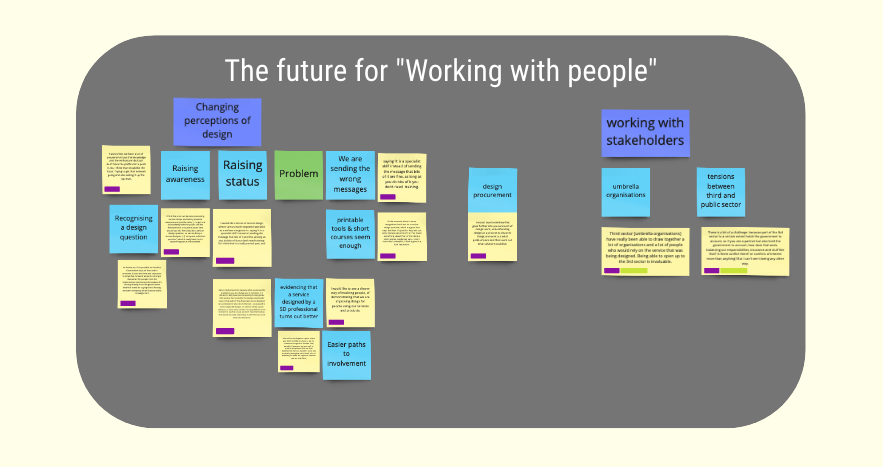Changing perceptions of design

Access the part of the Miro Board represented in the image
List of clusters of insights
Select one of the clusters of insights to see the quotes supporting it. Select it again to hide the quotes.
Raising awareness
- I worry that we have a lot of people who have the knowledge and the enthusiasm but just don’t have the platforms to push it. So, I think that should be the focus. Trying to get that network going and also selling it up the top level
- In the future, if it‘s possible for Scottish Government to push that and to promote it, have the time and resources to drive that forward, would be stronger than what the people from the improvement service can do because it‘s coming directly from the government. And that mandate saying that‘s the way we want everybody to do it would add a lot weight to it
Recognising a design question
- I think that a lot can be done promoting service design and raising people’s awareness around its value [... to get to a point where] both the public and the third sector in a couple of years time would say, ‘oh, this looks like a service design question, so can we bring a service designer [...] to try and solve that question’. which is really basic, but it doesn’t happen at the moment
Raising status
- I would like a future of service design where I am as much respected specialist as a software engineer is. saying ‘it is a specialist skill’ instead of sending the message that bits of it are fine, as long as you do bits of it you don’t need training. So I think that is a really central part
Evidencing that a service designed by a SD professional turns out better
- Data is really important, because when you know [the problems], you can change your [...] practice. [...] We don't really have that necessarily to really prove that services turn out better for people and provide value to the public if they have been service designed by a professional who can do their job - as opposed to some maybe BA doing it, or a doctor doing a quick decision, or some other version. It's very difficult at the moment to say that, cause we don't have that backup. That would be really interesting, if with time we could show the difference
Easier paths to involvement
- I would like to see a clearer way of involving people, of demonstrating that we are improving things for people using our services and products
- It would be nice to get to a point where you didn’t feel like you have to ask for permission to speak to citizens. That, actually, if you went out and look to speak to people and find out their experiences, that you wouldn’t cause any trouble by doing that. And I think a lot of the time you need the approval first and you can lose them
We are sending the wrong messages
- Saying "it is a specialist skill" instead of sending the message that bits of it are fine, as long as you do bits of it you don’t need training
Printable tools & short courses seem enough
- At the moment, there is some recognition that it can be a service design question, which is a good first step. But then it’s just like ‘hey, let’s use some tool we can print off,’ or ‘I’ve heard something about this’, or ‘I’ve done a short course, maybe we can...’. And I think that’s unhelpful, I think it gives it a bad reputation
Design procurement
- I would love to see how this goes further into procurement of design work, understanding design as a process to discover things and work out what problems are and then work out what solutions could be
Working with stakeholders
List of clusters of insights
Select one of the clusters of insights to see the quotes supporting it. Select it again to hide the quotes.
Umbrella organisations
- Third sector [umbrella organisations] have really been able to draw together a lot of organisations and a lot of people who would rely on the service that was being designed. Being able to open up to the 3rd sector is invaluable
Tensions between third and public sector
- There is a bit of a challenge because part of the 3rd sector to a certain extent holds the government to account, so if you are a partner but also hold the government to account, how does that work, balancing out responsibilities, insurance and stuff like that? Is there conflict there? or conflicts of interest more than anything? But I can't see it being any other way
Last updated: 01 Jul 2023